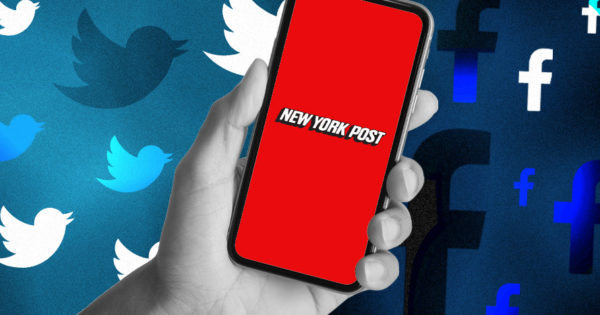Twitter and Facebook’s Editorial Decisions Clash With Questionable New York Post Reporting

When the New York Post published a dubious report this week about corruption and the Biden family, it pushed Facebook and Twitter to make a tough decision, but one that has been years in the making, showing that social media platforms can and will make editorial decisions that clash with those of name-brand publications.
The report claimed an unknown person dropped off a laptop at a Delaware repair shop in April 2019. On that laptop were emails allegedly showing that the younger Biden set up a meeting between a Ukrainian energy executive and his father. The Post says it received the computer’s hard drive from Rudy Giuliani, President Donald Trump’s personal lawyer.
The Biden campaign and former White House officials denied any such meeting ever happened. Third-party fact-checking organizations, such as PolitiFact, also questioned the veracity of the claims and, notably, no reputable news outlet has independently verified the Post’s report.
Additionally, there are serious questions about the source of the leak, which some suspect to be a “hack-and-leak” campaign, like in 2016 when Wikileaks published Hillary Clinton campaign manager John Podesta’s emails. (The U.S. intelligence community concluded that the emails were likely hacked by Russia and provided to Wikileaks).
The Washington Post reported today that the White House was warned by the U.S. intelligence community last year that Giuliani was the target of a Russian influence campaign, raising concerns that the New York Post article could also be a hack-and-leak.
American newsrooms and social media platforms have been preparing for such influence campaigns for some time now, but The New York Post’s story made those hypotheticals a reality less than three weeks before Election Day.
Stoppage on Social
Facebook said the story was eligible to be fact checked by the company’s third party partners and preemptively reduced the story’s distribution, though it was reportedly still shared more than 300,000 times.
Twitter went further, prohibiting the article from being shared entirely. In doing so, the company invoked its hacked materials policy, which bars users posting “content obtained through hacking that contains private information, may put people in physical harm or danger, or contains trade secrets.”
After some confusion, Twitter CEO Jack Dorsey admitted that communication around the decision was “unacceptable.”
By Thursday evening, the criticism led Twitter to acknowledge that this policy was overbroad and could have “many unintended consequences to journalists, whistleblowers and others.”
First, Twitter won’t remove hacked content “unless it is directly shared by hackers or those acting in concert with them,” and the platform will label, not block, tweets to provide context, said Vijaya Gadde, Twitter’s legal, policy, trust and safety lead.
The Post’s article will still be blocked from the site because it includes “personal private information,” Twitter spokesperson Brandon Borrman said. It’s unclear when this new policy will roll out, and users were able to tweet the New York Post link this morning.
A Twitter spokesperson did not immediately respond to a request for clarification.
Facebook and Twitter’s decisions align with recent behavior in which they’ve been more willing to exercise editorial discretion, especially regarding high-profile political matters like the president’s own tweets.
Twitter set off a storm of industry movement after it fact-checked Trump’s tweets about mail-in ballots in late May and then restricted a tweet of his about shooting protesters, which violated its policies around “glorifying violence.” Under pressure, Facebook, Reddit, Snap and other companies made notable content moderation decisions in the weeks that followed.
https://www.adweek.com/programmatic/twitter-facebook-editorial-decisions-questionable-new-york-post-reporting/